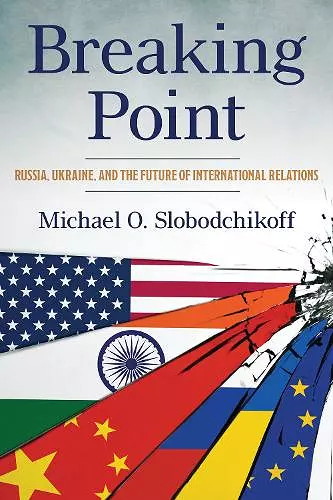Breaking Point
Russia, Ukraine, and the Future of International Relations
Dr Michael O Slobodchikoff author Dr Michael O Slobodchikoff editor
Format:Paperback
Publisher:Bloomsbury Publishing PLC
Published:27th Nov '24
Should be back in stock very soon

The global world order established following WWII is under attack by both Russia and China, and the war in Ukraine is just one front of that war.
The post-Cold War order established by the United States of America is currently at a crossroads. No longer is the liberal order and United States hegemonic power a given. Moscow and Beijing have both begun their challenges to the United States. While long dissatisfied with US hegemony, in February, 2022, Russian President Vladimir Putin ordered the invasion of Ukraine by the Russian military.
The response by the United States and its allies was swift and unprecedented. Wave after wave of sanctions were levied against Moscow, and NATO member states began to provide military support to Kyiv in trying to maintain its independence from Moscow. The first major war on the European continent since World War II was to have a profound global effect on relations with other countries. First, there was a significant demographic impact as migrants left Ukraine either to the West or to Russia. Further, as men were prevented from leaving Ukraine due to mandatory conscription, the refugees were overwhelmingly made up of either old people, or women with children. Russia also was not spared from a huge demographic crisis. Not only has it lost an enormous amount of young men to the war, but it also instituted forced conscription, leading to many men fleeing the country.
Initially Washington described the invasion of Ukraine as a war between democracy and autocracy, with Kyiv being on the front lines of this new war. However, the real situation was much more complicated than a simple framing of the conflict. While Kyiv enjoyed overwhelming support from the United States and its NATO allies, other democracies globally were a lot warier of supporting Ukraine. Countries like India, Turkey, Hungary, South Africa, Brazil, and other democracies began a strategy of hedging. Publicly, they urged caution in the conflict stating that while Moscow possessed legitimate security concerns, that the conflict had to be resolved peacefully.
The hedging strategy employed by much of the world confused Washington, however, the United States found its attention torn between two continents. The war in Ukraine was its main concern, however, a newly resurgent China threatened to begin its own war against Taiwan. Washington could ill afford a diplomatic blitz to force hedging states to support its policies in Kyiv. Moscow, on the other...
This edited volume combines the talents of an exceptionally well-informed group of scholars to analyse the impact of the Russo-Ukrainian war on a number of key issues, including the US global order, power shifts in northern Eurasia, the effect of sanctions, and some key bilateral relationships - Russia’s relations with China, Turkey, Iran, India and Africa. This highly-informative and balanced volume deserves to become a go-to work in the study of changing patterns in international politics. -- Richard Sakwa, University of Kent
ISBN: 9781538193785
Dimensions: unknown
Weight: unknown
206 pages